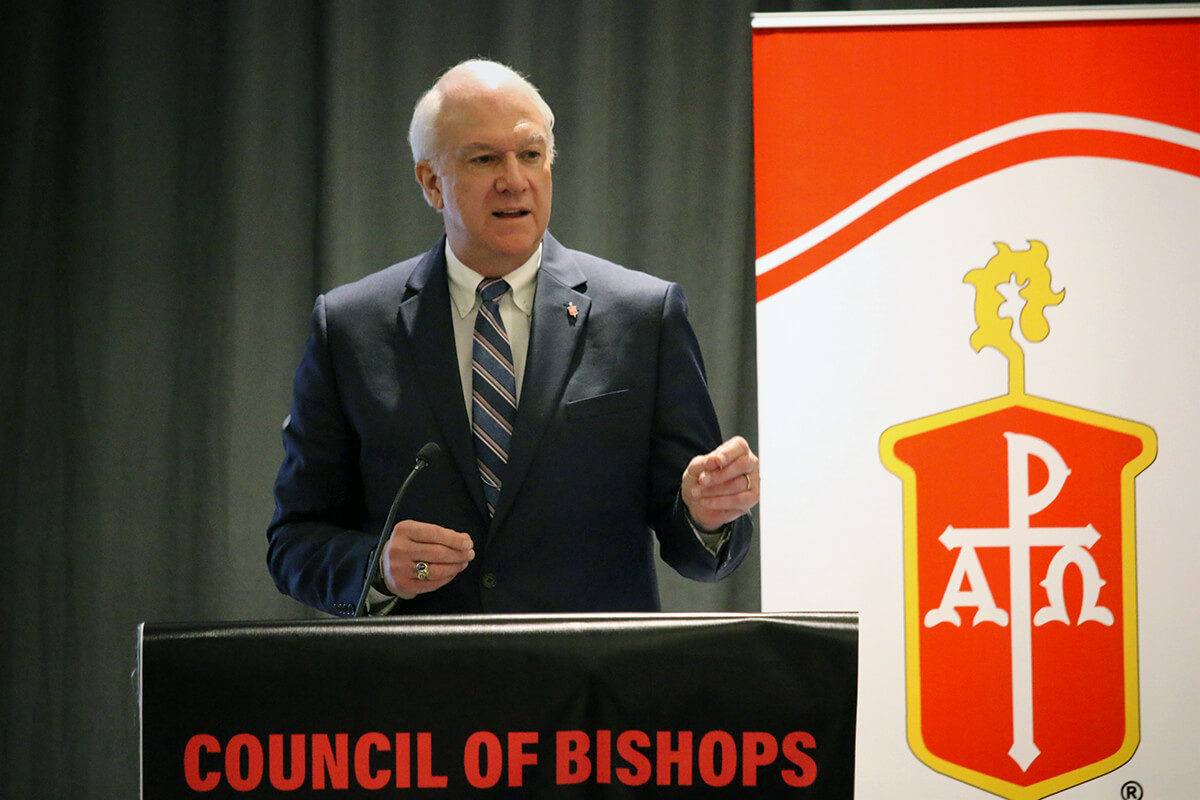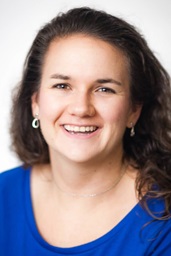Key points:
- Council of Bishops President Thomas J. Bickerton sees potential for big changes coming out of General Conference.
- In his final presidential address, he asked his fellow bishops to consider how they can use those changes to help center the church on its mission.
- Bishops do not have a vote at General Conference, but Bickerton stressed they do have a role in what comes next for The United Methodist Church.
Just days before the opening of the COVID-delayed General Conference, Bishop Thomas J. Bickerton told his fellow bishops that he sees the possibility for big changes coming out of The United Methodist Church’s top policymaking body.
Those potential changes include what many General Conference lay and clergy delegates have taken to calling “the three R’s.” Those are regionalization, the Revised Social Principles and removal of the denomination’s longtime restrictive language against LGBTQ people — including the end of the 52-year-old statement that “the practice of homosexuality …. is incompatible with Christian teaching.”
In his final address as Council of Bishops president, Bickerton said if any of these changes receives approval, or any combination of them, “this will represent one of those seismic shifts in who we are as a denomination.”
He called on episcopal and other church leaders to use “this seismic shift” to further the denomination’s mission of making disciples of Jesus Christ for the transformation of the world.
“If we can, we stand a very good chance of being able to see the next expression of United Methodism beginning to emerge,” Bickerton said at a pre-General Conference meeting that brought together about 95 active and retired bishops from around the world.
“Needless to say, this is a moment in time when we will not only see some of the dust settle, but we’ll also see new dust storms arise,” he said.
The bishops gathered at Charlotte’s downtown Omni Hotel, just a few blocks away from the convention center where lay and clergy delegates from four continents will convene April 23-May 3 to make decisions that shape the denomination’s future.
As Bickerton mentioned, three of the big proposals before delegates include:
- Worldwide Regionalization that aims to give the central conferences — seven church regions in Africa, Europe and the Philippines — and the U.S. equal authority to adapt parts of the Book of Discipline, the denomination’s policy book, to their missional context. Regionalization requires amending the denomination’s constitution. Ratification requires at least a two-thirds vote at General Conference and at least a two-thirds total vote at the denomination’s annual conferences, regional bodies with lay and clergy voters from multiple churches.
- Revised Social Principles, multiple petitions that revise the denomination’s social witness. As proposed, the revision would no longer make reference to homosexuality at all. Since 1972, the Social Principles have stated that “the practice of homosexuality… is incompatible with Christian teaching.”
- Removal of restrictive policies against LGBTQ people, including longtime bans on same-sex weddings and “self-avowed practicing” gay clergy.
Whatever they decide, delegates will not be the only ones making history at this landmark General Conference.
During the two-week meeting, East Ohio Bishop Tracy S. Malone will take the gavel as the next Council of Bishops president. Elected by her bishop colleagues, she will be the first Black woman to hold that role.
Bishops do not have a vote at General Conference. Instead they preside at plenary sessions, pray with delegates and preach at worship.
“We can’t vote, but we can convene and influence, inspire and pray,” Bickerton said. “And what that lends itself to is a deeper understanding and appreciation of our role as bishops here in Charlotte.”
He said that bishops also have a role in strategizing what comes next after whatever delegates decide shifts the lay of the land.
Bickerton, who also leads the New York Conference, has earthquakes on his mind after a 4.8-magnitude April 5 temblor — with an epicenter in New Jersey — jolted New York City and sent tremors across the U.S. Northeast.
“I actually thought, ‘Oh dear, what if something like this happened on a larger scale and we had to postpone General Conference again!’” Bickerton acknowledged at the beginning of his address.
“While some have suggested to me that this isn’t quite a bad idea, I do believe that it is time for us to be here.”
No question The United Methodist Church has already endured years of upheaval.
The pandemic has led to the repeated postponements of General Conference, which typically meets every four years, to eight years after the last regular session.
The denomination also has experienced the tumult of disaffiliations that has seen more than 7,600 U.S. churches, about a quarter of the denomination’s U.S. congregations in 2019, leave the denomination under a policy that expired at the end of last year.
Subscribe to our
e-newsletter
The denomination also has seen the exit of churches in Estonia, France, Bulgaria, Slovakia and Kenya. Some of those churches have left under procedures allowed by the Book of Discipline, and some did so without regard for procedures.
In any case, the result of these delays and departures is that a very different group of delegates is coming to the General Conference in Charlotte than gathered in Portland, Oregon, in 2016.
In addition to the other legislative possibilities he mentioned, Bickerton noted that the delegates will consider a steeply reduced denominational budget — a 43.8% cut compared to the denominational budget passed in 2016. That represents the largest reduction in the denomination’s history and results in scaled-down denominational ministries, including the number of bishops.
Under the proposed budget, the total of active bishops in The United Methodist Church would drop from 66 to 54. That number means funding 14 fewer bishops in the U.S., going from 46 to 32. Also, a plan to add five more bishops in Africa would drop to two additional bishops, raising the number of bishops on the African continent from 13 to 15.
U.S. bishops expect to cover larger areas and perhaps take on fewer denominational responsibilities. Bickerton said bishops can learn from the experience of colleagues in the central conferences, where bishops have long experienced providing episcopal oversight in large geographical areas, including sometimes multiple countries.
“But I would argue that the role of bishop is not changing,” Bickerton said. That role is outlined in Paragraph 403 of the Book of Discipline. The ministry includes leading in the spiritual disciplines, teaching the faith, casting a vision for the church, bearing prophetic witness for the transformation of the world and, significantly, working toward church unity.
Liberia Conference Bishop Samuel J. Quire Jr. said he felt Bickerton framed the role of bishop very well.
“Whatever happens here, we as bishops have to be the leaders,” Quire said. “We have to lead the church. Even though we do not have voting rights, as presider we need to direct this denomination.”
This will be Iowa Conference Bishop Kennetha Bigham-Tsai’s first General Conference as an episcopal leader rather than a delegate. She admitted that moving from the floor to sitting silently on the dais with fellow bishops is a bit of an adjustment. She, too, appreciated Bickerton’s reminder of the bishop’s role.
“He really directed us to be open to how the Spirit will move to shape the church going forward,” she said, “while we focus on those important pieces of really directing mission and ministry, really surrounding the delegates with the prayer.”
She added that prayer will be really important. As she knows from experience as a delegate, General Conference can be “very volatile and very hard work.”
Bickerton acknowledged early in his address that one source of anxiety in the coming General Conference is that some delegates and some seeking to influence them already have plans to leave The United Methodist Church.
A number of the congregations that disaffiliated have since joined the Global Methodist Church, a theologically conservative breakaway denomination that launched in 2022. But the unofficial advocacy groups that helped form the new denomination, the Wesleyan Covenant Association and Good News, still plan to have representatives at General Conference — to champion disaffiliation and oppose regionalization.
“There is the risk of who will actually be in the room,” Bickerton said. “Attempts have and likely are being made to organize people who have no intention to be in the room long term but are, for some reason, reveling in the thought that perhaps they can make one last parting jab before their exit.”
Many delegates who are coming to General Conference also are filled with angst resulting from past turbulent General Conference sessions, Bickerton acknowledged. Many across the denomination, including bishops, also are concerned that a number of delegates from Africa will not receive visas or plane tickets to attend.
All of these worries brought to Bickerton’s mind the experience of some of the earliest Christians.
As Scripture for his address, Bickerton used Ephesians 4:1-6,14-31, in which Paul encourages the quarrelsome church in Ephesus to put away “all bitterness and wrath and anger and wrangling and slander, together with all malice.” Instead, Paul urges these early churchgoers to “be kind to one another, tenderhearted, forgiving one another, as God in Christ has forgiven you.”
Bickerton noted that Paul understood how important Ephesus, a major port city in Asia Minor, was for the mission of spreading the Gospel.
“If the church could work there, it would have a major impact on the movement of Christianity everywhere,” Bickerton said.
Likewise, he added, if bishops and other United Methodists can work together here in Charlotte, the denomination can continue to have impact around the globe.
“But we have to stay focused and on point,” he said. “And we have to be bold to lead with a vital and renewing spirit, a commitment to teach, a vision for the church, a commitment to transformation and a passion for unity.”
Hahn is assistant news editor for UM News. Contact her at (615) 742-5470 or newsdesk@umnews.org. To read more United Methodist news, subscribe to the free daily or weekly Digests.




